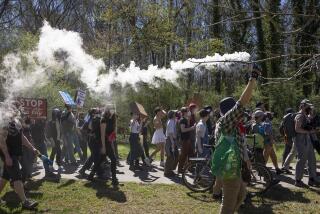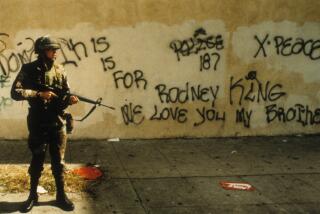Amid chaos, some black activists say the message has been hijacked
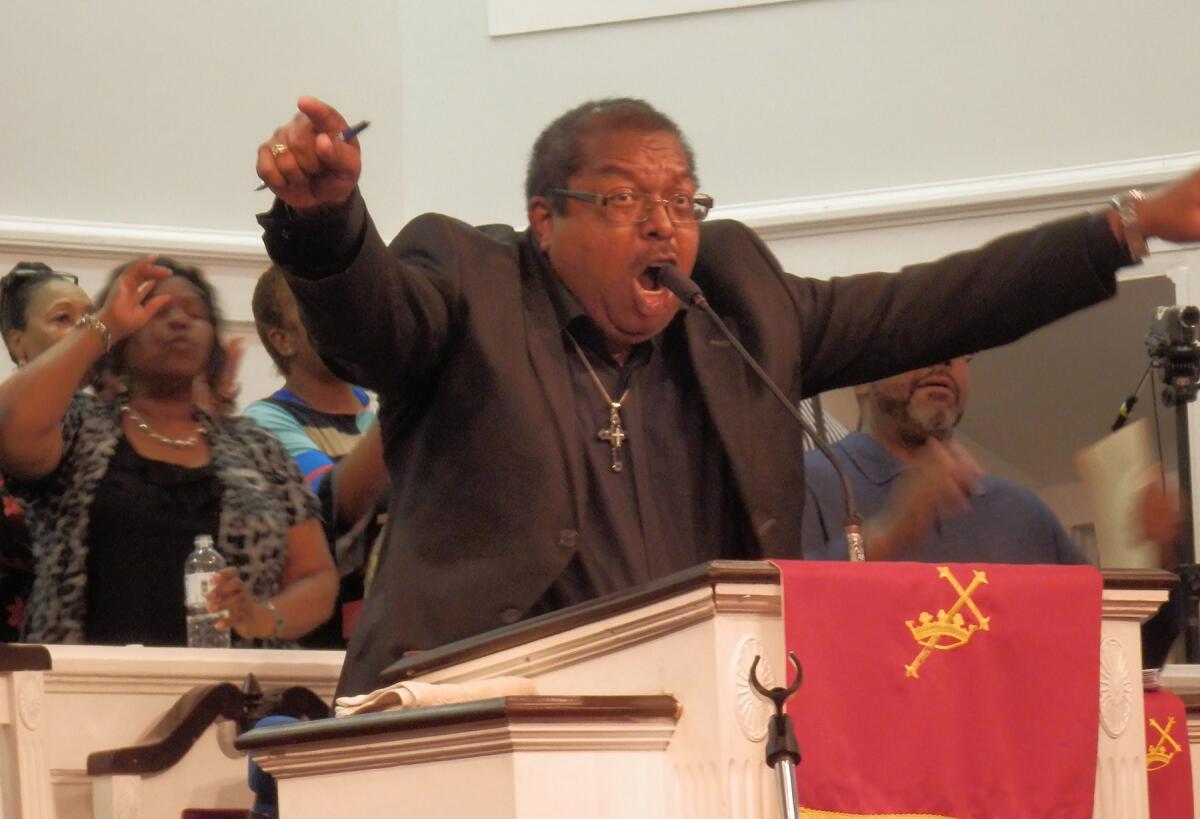
- Share via
ATLANTA — In almost 45 years confronting racism in the historic cradle of the nation’s civil rights movement, the Rev. Timothy McDonald III has marched in countless peaceful protests against police violence.
But waking Saturday morning in a city strewn with glass and rubble after a demonstration against police brutality erupted into chaos and looting, McDonald, 65, a former leader of the Southern Christian Leadership Conference, found himself feeling grateful that Gov. Brian Kemp had called in the National Guard to help restore order.
“I never thought I’d see the doggone day that I’d be happy to see the National Guard standing out on Peachtree Street,” McDonald said.
After police used tear gas to disperse the crowd, McDonald praised law enforcement officials for exercising restraint as protesters broke into luxury stores and set police cruisers ablaze.
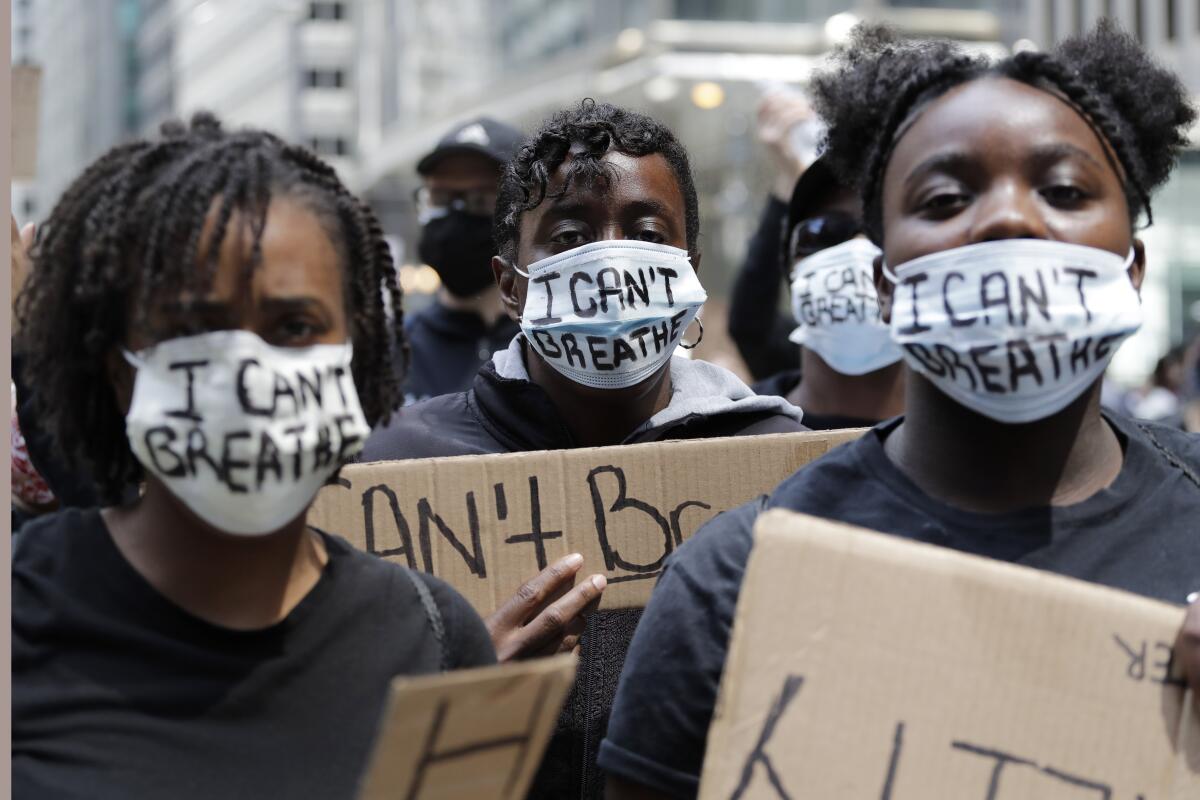
“I don’t want anybody to die, and I think we were very close to it last night. We were on the edge.”
Across the nation, black activists grappled Saturday with how to take back control of the message after ongoing protests against the police killing Monday of George Floyd in Minneapolis turned violent. In Atlanta on Friday night, protesters hurled rocks and paving stones at police cars and smashed the windows of the CNN Center. In Portland, Ore., the downtown sheriff’s headquarters was ransacked. In Detroit, a 21-year-old man died, police said, after being shot by a man who fired into a van parked near downtown protests and then fled on foot.
“Those are not our people down there,” McDonald said of the mostly young protesters, many of them black, who looted Atlanta’s tony Buckhead district in the early hours of Saturday. “They would throw a brick at me, that group.”
Many leading civil rights activists and city officials were quick to berate outside agitators who they believed hijacked their peaceful protests and egged on opportunistic looters for their own purposes rather than in the memory of Floyd.
At the same time, some activists say that the destruction unfurling in cities across the country is the natural end result of hopelessness endured by generations of poor and working-class people of color who feel abandoned by the political process.
“I thank God that we have people in the streets,” Harvard University philosophy professor Cornel West said Friday on CNN’s “Anderson Cooper 360” news show. “Can you imagine this kind of lynching taking place and people are indifferent, people don’t care, people are callous?”
West said that not only has President Trump’s “neo-fascist” administration failed to share wealth, power and respect, so did the “neo-liberal” moderate wing of the Democratic Party — even under an African American president.
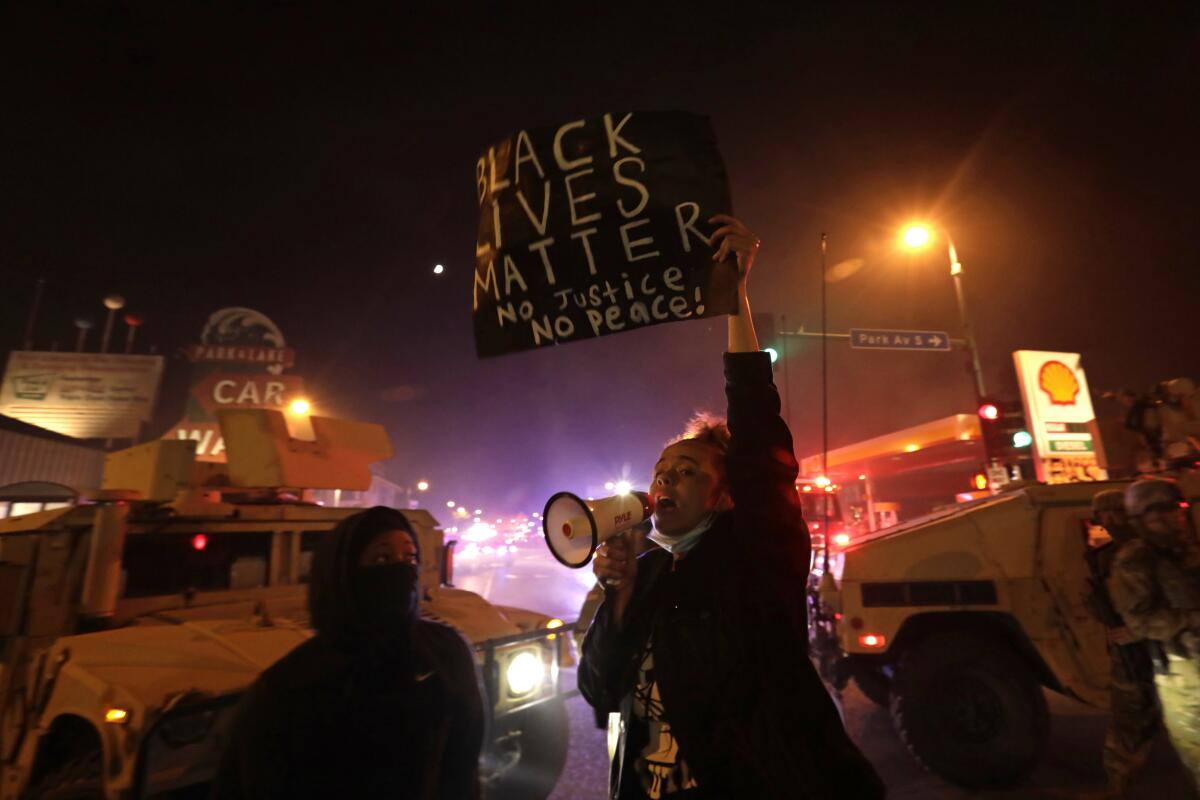
“If we don’t get that kind of sharing, you’re going to get more violent explosions,” he said.
In Minnesota, Gov. Tim Walz said thieves, white supremacists and anarchists have used nightly protests over Floyd’s death as cover to loot and set fires.
Some protesters agreed — although most said they still planned to defy a nightly curfew to make their voices heard.
“These people are opportunists — they are using these protests,” said Isabel Pone, 26, as she stood among several hundred protesters Saturday near a memorial where police fatally restrained Floyd.
Pone, a singer and actress with black and white parents, said she saw white rioters mingling with protesters this week, drinking and “screaming anarchy.” Some arrived with stones, bats and hammers in hand. On Saturday, Pone and about 20 friends were volunteering as medics while monitoring social media for reported sightings of white supremacists on the streets.
“We’re here to protect our people,” she said.
Shamell Bell, 35, a founding member of Black Lives Matter and now a professor of African American studies at Dartmouth College, said in a phone interview that the protests and destruction of property reflected the younger generation’s growing disillusionment about race and police brutality in the United States.
Tensions, she said, had been simmering for years.
“My son grew up in the Black Lives Matter movement, and when he was 5 he asked me: ‘Mommy, are you going to get shot by the police or government?’” she recalled her now 9-year-old asking. “I cried. I had no answer but tears. I didn’t know if I had to be a martyr for the movement.”
In recent months, she said, people of color took notice when white supremacist groups emerged in rallies across the U.S. to protest against stay-at-home orders.
“The catalyst was the coronavirus,” she said. “We’ve been prodded by a race war. This is the moment.”
In Atlanta, a city that prides itself not just on its historic civil rights legacy but on an ability to negotiate conflict, many of the city’s political and cultural leaders were stunned to see the windows smashed in upscale stores, restaurants and apartment buildings along the main thoroughfare, Peachtree Street.
For decades, the city has largely avoided violent protests.
“What I see happening on the streets of Atlanta is not Atlanta,” Mayor Keisha Lance Bottoms said Friday night at a news conference at police headquarters. “This is not a protest. This is not the spirit of the Rev. Martin Luther King Jr. This is chaos. A protest has purpose.”
Her voice swelled as she reminded Atlantans of the city’s long legacy of black mayors and police chiefs and minority business ownership.
“When you burn down this city, you’re burning down our community! If you want change in America, go and register to vote!... You are disgracing our city. You are disgracing the life of George Floyd and every other person who has been killed in this country.”
In Portland, Mayor Ted Wheeler declared a state of emergency and imposed a citywide curfew as businesses were looted and cars set on fire.
“I cannot stand by and watch our city be destroyed,” Wheeler said Saturday during a news conference. “Nor will I stand silent as men like George Floyd are murdered by the very institutions that are supposed to protect them. Both of these things can be true simultaneously.”
In Atlanta, where the protesters were mostly black, many civil rights activists did not shy away from condemning those who resorted to violence — even if they cast them as outsiders who were not from the city.
“I’m angry,” said Gerald Griggs, an Atlanta attorney and vice president of Atlanta’s NAACP, who said the protest had been hijacked by outside agitators. “There’s no reason to deface property. That’s not the spirit of protest that has been in Atlanta forever.”
Still, Griggs did not agree entirely with Mayor Bottoms. He said her message — that Atlanta was more progressive than other cities — was far too rosy. In the last five years, he said, at least six black men had been fatally shot by Atlanta police in cases that were still unresolved.
“There are individuals in our community who are very upset that justice has eluded them for years,” Griggs said.
Jarvie reported from Atlanta and Read from Seattle. Times staff writers Molly Hennessy-Fiske in Minneapolis and Melissa Etehad in Los Angeles contributed to this report.
More to Read
Sign up for Essential California
The most important California stories and recommendations in your inbox every morning.
You may occasionally receive promotional content from the Los Angeles Times.
